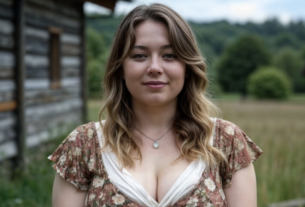Olga stood at the living-room window, watching Lena get out of her car. Lena waved, smiling broadly, and headed for the porch. The third time in two weeks already.
“Ol-ya!” Lena burst into the entryway with a bouquet of roses and a bag with wine. “How could I say no? Sergey insisted so much that I come for the weekend.”
Olga took the flowers, feeling her shoulders tighten. Sergey insisted. Of course.
“Come in,” she said evenly. “Tea’s ready.”
She and Sergey had finished building the house in the spring. They’d spent six months choosing and refining the design, and another year and a half on construction. Olga had chosen every detail herself: the bathroom tile, the bedroom parquet, the chandelier above the dining table. It was their home—hers and Sergey’s. And now Lena was constantly spinning around in it.
It all started with the housewarming in May. Olga had invited her friend herself—they’d been friends since their student days, though in recent years they hadn’t seen each other often. Lena had divorced a year earlier, rented an apartment in the city, and worked at some consulting firm. At the housewarming she arrived in a tight dress, with a new haircut and makeup that was clearly done by a professional.
“Seriozhenka, you’re amazing!” she exclaimed, looking around the living room. “Olenka told me, but I never imagined it would turn out this gorgeous!”
Sergey smiled modestly.
“We tried together. The architect helped, of course, but the main ideas—”
“Oh, come on, come on! You can tell a man’s hand right away! Those beams on the ceiling, the fireplace—those were your decisions, weren’t they? Olga told me how you thought everything through, how you wrote down ideas at night.”
Olga watched her husband straighten his shoulders. He was forty-two, gray at his temples, complaining about his back in the mornings. But now, under Lena’s admiring gaze, he looked ten years younger.
After that evening Lena started coming regularly. At first for a day, then staying overnight. The guest room was free—why let it sit empty, right? By midsummer Olga noticed her husband asking himself:
“Where’s Lenka been? Haven’t seen her in a while. Maybe we should invite her over for shashlik?”
“Sergey, she’s been here three times this month.”
“So what? You don’t need a friend?”
A friend. Olga watched Lena help Sergey light the grill, laugh at his jokes, admire every little thing—the new path to the bathhouse, the rosebed, even the woodshed Sergey had knocked together over the weekend.
“Seryozh, you’ve got golden hands!” Lena chirped, tipping her head flirtatiously. “Men these days are all so… city. But you—you’re a real хозяин, a real man of the house!”
Sergey beamed. At home these last six months he’d been quiet and lost in thought. Olga knew why—problems at work, some reorganization, a new boss. In the evenings he came home tired, ate dinner in front of the TV, went straight to his phone. They talked little, and about anything important—not at all. Twenty years of marriage had worn them into each other so tightly that conversation no longer seemed necessary. Or seemed unnecessary.
But Lena admired him. Lena raved. Lena didn’t see a tired middle-aged man with thinning hair and a soft belly—she saw a successful хозяин, a builder, a provider.
“Olenka, you praise him too little,” Lena said once as they washed dishes after dinner. “Men are like children—they need attention.”
Olga silently dried a plate. Men are like children. For twenty years she’d praised Sergey—for his career, for the house, for not drinking, for bringing money home. And now someone was explaining to her how to handle her husband.
August was stifling. Olga worked remotely, sitting all day at her computer in the cool upstairs office. Sergey drove to the office and came back around eight. Routine.
Then Lena started showing up on weekdays.
“Olya, I’m working from home today—can I stop by? The heat in the city is brutal, but you’ve got it cool out here.”
The first time Olga agreed. The second time she said nothing. The third time, when she came down for lunch, Lena was already on the terrace with her laptop, in a light sundress, hair loose.
“Seryozh gave me keys,” she explained without looking up from the screen. “Said I shouldn’t be shy. You don’t mind, do you?”
Convenient. Olga made herself coffee and went back upstairs. She couldn’t work—her thoughts kept circling what was happening in her home. She listened to the sounds downstairs: Lena talking on the phone, laughing, then turning on music. Acting like the mistress of the place.
That evening Sergey came home earlier than usual.
“Lenka here?” he called from the entryway. “Great! I bought wine—let’s sit on the terrace.”
At dinner Lena talked about some project at work. Olga noticed how her friend leaned toward Sergey when he poured the wine, how she touched his hand as she explained something. Sergey listened carefully, nodded, joked. Olga hadn’t seen him like that in a long time—alive, engaged.
“Seryozh,” Olga said when Lena went to shower, “maybe that’s enough already? She’s here every week.”
“What do you mean, ‘enough’?” her husband said, surprised. “She’s your friend, after all.”
“A friend, but—”
“But what? Are you that stingy? The house is big, the guest room’s empty. It’s hard for her after the divorce—at least we can support her.”
“Support her,” Olga repeated. “Sergey, you don’t notice how she behaves?”
“How?” He frowned. “She behaves fine. Friendly, cheerful. Maybe you’re just jealous that she’s in a good mood?”
Olga fell silent. Explaining was pointless. He didn’t see—or didn’t want to see—how Lena looked at him, how she found reasons to touch him, how she laughed at his jokes just a bit louder than necessary.
September began with rain. Olga had a routine checkup scheduled—a mammogram, a therapist, the usual set. The appointment was at ten in the morning at a private clinic forty minutes from home.
On Wednesday she rushed around getting ready. Sergey had already left; the house was quiet. Olga grabbed her bag, her keys, ran to the car—and halfway there remembered her phone was still on the kitchen table. Go back? She checked the time. If she turned around now, she’d definitely be late. Fine. Somehow.
At the clinic there was confusion. The doctor was delayed, the receptionist apologized and asked her to wait. Olga sat for half an hour in the lobby with a glossy magazine she wasn’t reading. Then they told her the doctor had gotten sick and the appointment would be rescheduled.
“You can rebook—”
“I don’t have my phone,” Olga answered automatically. “I left it at home.”
And then it hit her. She had time. She could go back, pick up her phone, and not hurry anywhere. A strange feeling—an hour of freedom suddenly appearing.
She got home around eleven. She left the car by the gate and didn’t drive it into the garage. She climbed the porch steps, opened the door—and froze.
Someone was laughing in the living room. A woman’s laugh—light, flirtatious.
Lena.
Olga quietly slipped off her shoes and listened. Sergey should be at work. Should be. So Lena was alone? But then who was she laughing with?
“Oh, Seriozhenka, don’t play the modest guy,” came from the living room.
Sergey’s voice, uncertain:
“Len, what are you doing? Olya could come back.”
“Olya’s at the doctor till noon.” More laughter. “Relax. We’re just talking.”
Olga moved carefully down the hallway toward the living room. The door was ajar. She could see Sergey’s back—he was sitting on the couch, tense. Lena stood beside him, leaning on the couch back, bending toward him.
“I’ve wanted to tell you for a long time,” Lena continued in a quiet, insinuating voice. “You’re so… real. Strong. Next to you I feel protected.”
“Lena, stop,” Sergey tried to stand up, but she put a hand on his shoulder.
“Why stop? A man should hear that he’s attractive, successful, desired. Does Olga ever tell you that?”
“Lena, this is…” Sergey was clearly flustered. “We’re friends. You’re my wife’s friend…”
“And I want to be something more.” She ran her hand over his shoulder. “Seryozha—don’t you feel anything? I can see the way you look at me. How you come alive when I arrive.”
“Lena, enough!” Sergey stood up sharply, pulling away. “What are you even talking about? I have a wife. A family!”
“A family,” Lena mocked. “A formality you’ve had for a long time. You just live side by side. And I can give you what you’re missing. Attention. Admiration. I see the real you.”
“You’re out of your mind…”
Olga stepped into the living room.
Lena turned first. Surprise flashed across her face, then something like annoyance—but she quickly forced a smile.
“Olya! And you—”
“I forgot my phone at home and got confirmation of my suspicions,” Olga said calmly. “Pack your things, Lena. Now.”
“Olya, we were just talking…”
“Pack your things. Or I’ll carry them outside myself.”
Sergey stood pale and stunned. He opened his mouth, but Olga raised her hand.
“Quiet. For now—quiet.”
Lena tried to say something else, but Olga’s look stopped her. She pressed her lips together, turned, and went upstairs. Five minutes later she came down with a bag and walked past them to the door.
At the threshold she turned around.
“Olenka, I didn’t mean—”
“Out,” Olga said softly but hard. “And don’t come near my home. My family. Forget the way here.”
The door slammed. They were alone.
Sergey sank onto the couch and buried his face in his hands.
“Olya, I didn’t… she did it herself…”
“I know,” Olga sat down in the chair opposite. “I saw.”
“I didn’t want… I honestly didn’t understand what she was getting at. I thought she was just friendly, outgoing.” He looked up at her. “God, I’m a complete idiot.”
“Yes,” Olga agreed. “An idiot.”
They fell silent. Outside the window, rain drizzled.
“You told me,” Sergey said quietly. “And I didn’t listen. It felt nice, you know? Nice that someone thinks I’m interesting, successful. Everything’s bad at work—the boss is an asshole, I’m not getting a promotion. And at home we… we stopped talking, Olya. We live like neighbors.”
Olga nodded slowly. He was right. They had stopped talking. When did it happen? A year ago? Two? They dissolved into daily life, work, the building of this house. They built the house—but what else was left?
“It felt good to feel needed,” Sergey went on. “By someone, at least. But I wasn’t going to… I couldn’t even imagine…”
“I know,” Olga repeated. “You pushed her away.”
“Do you forgive me?”
“I don’t forgive,” she said. “I just understand.”
Again they were quiet. The rain grew heavier, streams running down the glass.
“So what now?” Sergey asked.
Olga looked at him. Forty-two, gray at the temples, tired eyes. Twenty years together. The house they built. The life they assembled brick by brick.
“Now,” she said slowly, “we’re going to talk. For real. Not about bills and what to buy for dinner. About us. About what’s happening.”
“I don’t know how,” Sergey admitted. “I guess I forgot.”
“We’ll learn again.”
She stood and went to the window. The house they built. Their house. The one where they nearly lost each other without even noticing.
“Seryozh,” she said without turning around, “when was the last time you told me I mattered to you?”
“I don’t remember,” he answered softly.
“Exactly.”
He came over and stood beside her. They stood at the window, watching the rain.
“You matter to me,” Sergey said. “Always have. I just… forgot to say it.”
“I forgot too,” Olga turned to him. “To tell you you’re doing great. That I’m proud of you. That this house is your achievement no less than mine.”
He took her hand—carefully, as if afraid she’d pull away.
“We’re both idiots,” he said.
“Yes,” Olga smiled. “Total.”
They stood there holding hands, like they used to when they were young. Rain drummed on the roof of their house—a house that now needed to be filled not only with furniture and comfort, but with conversations, attention, warmth.
“Olya,” Sergey said quietly. “I’m sorry.”
“I’m no angel,” she replied. “I’m guilty too. We both missed the moment we became strangers.”
“We’re not strangers,” he objected. “We just… got distracted.”
Maybe he was right. Maybe they really had just gotten distracted—by the house, work, everyday life. And nearby there was always someone ready to take advantage of it.
“No more,” Olga said. “No more getting distracted.”
“No more,” Sergey nodded.
The rain began to ease. Over the forest, sunlight broke through.
That evening they sat on the terrace—just the two of them, like they hadn’t in a long time. They drank tea and talked. About work, plans, what they wanted to change. Slowly, carefully, they felt for the thread they’d almost lost—the one that had tied them together all these years.
“You know,” Sergey said, watching the sunset, “I like our house. But only when it’s just us in it.”
“Me too,” Olga smiled.
The phone—the reason she’d come home—was still lying on the kitchen table. She never picked it up. She didn’t need it. Because the most important conversation that day happened without calls, without messages, without intermediaries.
Just two people who almost lost each other sat on the terrace of their home and learned to hear each other again.
It was a beginning. Not perfect, not easy. But it was their beginning.



